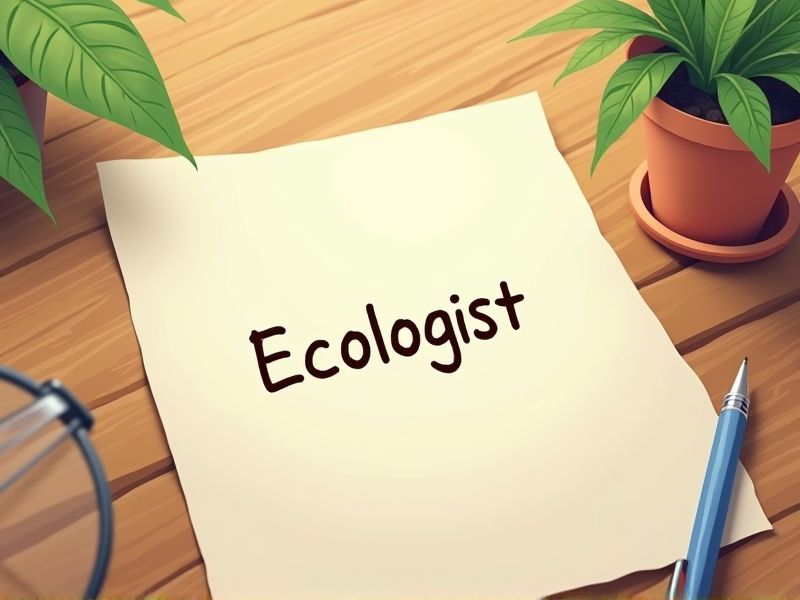
Ecologists often work in complex environments that require specialized knowledge, and certain certifications ensure they possess the necessary skills to navigate these challenges. Certifications provide a standardized framework, verifying that ecologists meet industry-specific competencies which enhance their credibility and professional growth. They also demonstrate a commitment to ethical practices and continued learning, which is crucial for addressing evolving ecological issues. Here are several key certifications that an ecologist might consider obtaining.
Certified Ecological Restoration Practitioner
Increased human impact has led to ecosystem degradation, requiring expert intervention for restoration. Certified Ecological Restoration Practitioners possess specialized skills that ensure effective rehabilitation methods. These professionals follow scientifically-tested protocols, which bolster project success rates. Regulatory bodies often mandate certified practitioners to ensure compliance with ecological standards.
Certified Wildlife Biologist (CWB)
A Certified Wildlife Biologist brings specialized expertise in wildlife management, aiding ecologists in developing comprehensive conservation strategies. Their certification ensures adherence to established scientific standards, enhancing the credibility of ecological studies. Experience in field research allows them to accurately assess wildlife habitats, providing ecologists with detailed observations. The collaboration between a CWB and an ecologist results in more informed decision-making, benefiting both ecosystems and biodiversity conservation efforts.
Certified Environmental Professional (CEP)
Certified Environmental Professionals (CEPs) are essential for ecologists as they ensure adherence to industry standards and regulations, promoting sustainable practices. Their certification validates expertise and credibility, which can enhance trust among stakeholders and facilitate collaboration. The rigorous certification process equips ecologists with up-to-date knowledge and skills, crucial for addressing complex environmental challenges. Employers and clients often prefer certified professionals, increasing job opportunities and career advancement for ecologists with CEP credentials.
GIS Professional (GISP)
Ecologists need GIS professionals because GIS systems enable spatial analysis, which is critical for mapping and understanding species distributions and habitat availability. By employing GIS technology, ecologists can more accurately assess environmental impacts and simulate ecological scenarios, facilitating data-driven conservation strategies. GIS professionals provide the technical skills necessary for integrating and visualizing large ecological datasets, enhancing the ability to track changes over time. Without GIS expertise, ecologists might struggle to effectively communicate spatial relationships and patterns essential for ecological research and policy development.
Environmental Impact Assessment (EIA) Certification
Environmental Impact Assessment (EIA) Certification ensures ecologists understand the comprehensive assessment processes needed to evaluate potential environmental consequences of development projects. This certification facilitates ecologists in effectively communicating risks and mitigation strategies to stakeholders, thereby influencing project planning and design. Through EIA certification, ecologists gain access to standardized protocols and tools that help maintain ecological integrity and biodiversity conservation. Accreditation through EIA certification also enhances an ecologist's professional credibility and reliability in contributing to sustainable development practices.
LEED Accredited Professional (LEED AP)
LEED Accredited Professionals possess knowledge about green building practices, directly supporting ecologists in promoting sustainable development. Their expertise assists ecologists in designing projects that meet environmental standards, reducing negative ecological impacts. By collaborating, they help optimize resource efficiency, which aligns with conservation goals. The LEED AP credential adds credibility to ecological projects, increasing stakeholder trust and support.
Certified Habitat Restoration Specialist
Certified Habitat Restoration Specialists bring advanced skillsets necessary to rehabilitate and restore ecosystems damaged by human activity or natural disturbances. These specialists ensure restoration projects comply with environmental regulations and best practices, which maximizes long-term success rates and biodiversity recovery. With their expertise, ecologists can address complex challenges like invasive species management and degraded habitat revitalization more effectively. This certification also enhances collaboration among multidisciplinary teams by providing a standardized knowledge base and credibility.
Certified Wetland Scientist
Certified Wetland Scientists provide essential expertise in identifying and evaluating wetland ecosystems, which helps ecologists understand habitat dynamics and biodiversity. This certification ensures accurate assessments of wetland health, critical for guiding conservation efforts and influencing policy decisions. Wetland Scientists' specialized knowledge assists ecologists in determining the impact of environmental changes and development projects on these crucial areas. Their input is vital in creating management strategies that balance ecological integrity with human activities.
Environmental Law & Policy Certification
Environmental Law & Policy Certification equips ecologists with a comprehensive understanding of legal frameworks, allowing them to effectively advocate for conservation measures. This certification enhances their capability to navigate complex regulations, ensuring that ecological research aligns with legal requirements. As environmental challenges grow, ecologists with this certification can influence policy development, promoting sustainable practices. Knowledge of environmental law empowers ecologists to collaborate more effectively with policymakers and stakeholders in achieving conservation goals.
Certified Climate Change Adaptation Professional
Ecologists face complex environmental challenges, and having a Certified Climate Change Adaptation Professional provides them with the skills to develop effective adaptation strategies. Climate variability often leads to biodiversity shifts, necessitating trained professionals to implement sustainable conservation measures. Resilience-building in ecosystems requires a comprehensive understanding of climate models and mitigation techniques, best managed by certified experts. Increased public and policy focus on climate adaptation enhances the demand for professionals who can bridge science and practical application in ecological settings.
Summary
When you obtain certifications as an ecologist, your credibility in the field increases significantly. Certifications validate your expertise, making you more attractive to employers and research institutions. They often lead to enhanced job prospects and potential salary increments. With recognized credentials, your influence in ecological projects and policies likely grows.
